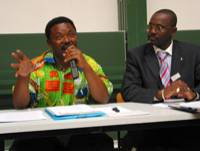

Derived from this use they have to face many problems, for example pollution and other environmental problems. There are some NGO that are involved in the protection of the environment and they are doing their best to protect it. But these are also facing some other problems or handicaps, like intoxication and others.
Pollution is not specific a problem of the Republic of Congo, it exists also in the other least developed countries in South America and in Asia. The problem of biomass is a problem that concerns to all people who do not have access to conventional energy.
In most of the little developed countries people are still using the old cooking system. These are simply three spoons put together and on top of them you put a casserole or whatever you use for cooking. Up to now this type is still in use. In order to change this system we were thinking about a form of cooperation. Now I will explain something about this cooperation.
Since the 50thies there were some new strategies to give up the old cooking system. The motivation for these new strategies was the fight against desertification and the concern about protecting the environment. The result was the development of some new cooking systems in Kinshasa. One is the so-called JIGO. JIGO is made from clay.
With the aim to protect itself against accidents, against desertification, intoxication and other problems, the population is trying to improve the kind of cooking systems they have been using until now.
In the present, they are not only using the "NGO", but they are also trying to introduce the solar cooker with the help of Dialog International. We have a good cooperation with this organization. Now we have made some improvement in West and also in East Congo. From time to time trainings are also taking place for people who live in the villages to learn how these systems are working.
The new system we received from Dialog International is still very primitive and needs to be improved. It is called ILOG.
Our participation in this symposium is very important for us. I came here with the hope to meet people with knowledge in that area. I hope we can come together and change our ideas in order to improve the performance and the quality of the ULOG cookers we have at our disposal in Congo. We also received as a result of the cooperation with ANAMED, also a NGO another solar cooker. But we still have some problems with the ability of this system too because it is very expensive and, as you know, the population does not have enough money to pay for it. The other problem is to make accessible this system to the population. A way to make it accessible is to train people who wish to work with it or maintain it.
We have to create a mechanism to make the solar cooker available. So I want to speak about the so-called micro credit.
As you know, usually the poor populations in least developed countries donÕt have the possibility to go to the bank to ask for credit. That is why we created this mechanism.
How does it function?
We have tried to organize people with little income into mini-groups. We call these groups solidarity groups because the members have some kind of ability or affinity to be together. In these groups the members work together in order to pay the solar cooker with the accumulated money after a certain period of time.
The guarantee offered for the micro-credit is the solidarity between the members of the groups. Generally the groups have between 10 and 25 members. We experienced that a group with more than 25 members doesnÕt work anymore.
The main idea behind the micro-credit is to find a way for the population to take care of themselves. We offer credit in cash and also in hardware - that means, we can give devices to the farmers and others. We are also able to give credit for solar cookers. In this case the system we offer is a rotary use of the cooker. Every member in a group will be able to use the solar cooker.
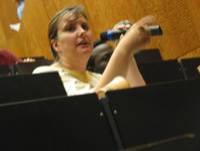
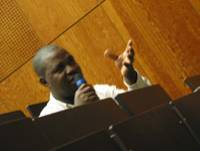
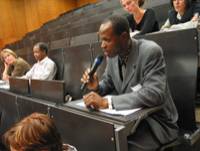
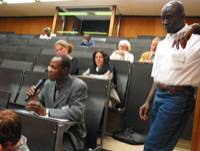
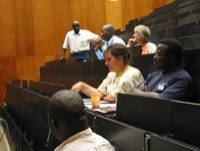
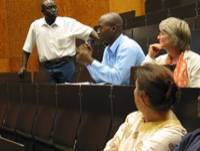
Most of the time, the solar cookers received are for personal use only. The money used to pay back the credit for the solar cookers comes from different activities, for example from what farmers earn selling farming products.
After selling all those products and putting the money together, the members of a group are soon able to reimburse the money lent for a solar cooker.
Besides these credits we are also offering trainings to show how to save money. We are sure that with that money they can improve the standard quality of their lives. This is also a result of coming together and knowing each other in a group.
This micro-credit mechanism has been copied from one existing in Bangladesh. In Bangladesh we have seen that these kinds of groups not only succeeded in getting their own solar cookers, but also were able to save enough money to found a bank with more than 10.000 customers.
We want to show you on the board how something like this is possible.
The micro-credit does not function like a bank-credit. On this side you have what the bank calls products: social assistance, loan and so on; on the other side is listed up what you can do by yourself, for example being a member of those groups we already described.
We can compare such a group with a bank. To become a member of a group you have to pay the membership. The amount to pay is one dollar - that means 25 dollars if the group has 25 members. There is also a social capital in the association. The members pay a dollar to create this capital.
Each member of a group can ask for a loan. They can ask for example for one dollar. After a period of time they have to pay back the money and also the interests. The interests from that loan are divided in two parts: 70% go to the so-called originally safe, 25% are used to create a second fond called assistant fond, so if something happens to one member of the group or their family members, it should be possible to assist that person financially.
There is still one special safe. In this special safe the members can save their money without obligation. For saving their money in this special safe they also get interests. This kind of system is quite common in African countries, but in this case they are trying to do it in a modern way. The other difference is that persons who donÕt belong to the group are also allowed to ask for a loan. But this kind of loan is different from the one given to the members.
To summarize what I have been saying, I want to explain again that our purpose is basically to make the solar cooker available for the normal population in least developed countries.
We have started with ten groups of 15 person each, for the moment. This system is working very well.
But first of all, we have to train these people, before starting a group. We offer them our help and support in the beginning. We train and give them our support in one activity: maybe in agriculture, in farming or in a little business.
Because they are already doing an activity, they are able to save one dollar from what they earn from that.
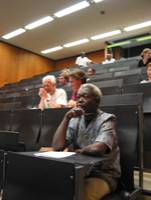
To finish I want to say how much I appreciate the relationship between Dialog International and our organization. I would like to see this kind of cooperation extended to other African countries and other organizations. The question is now: How can we make this possible?